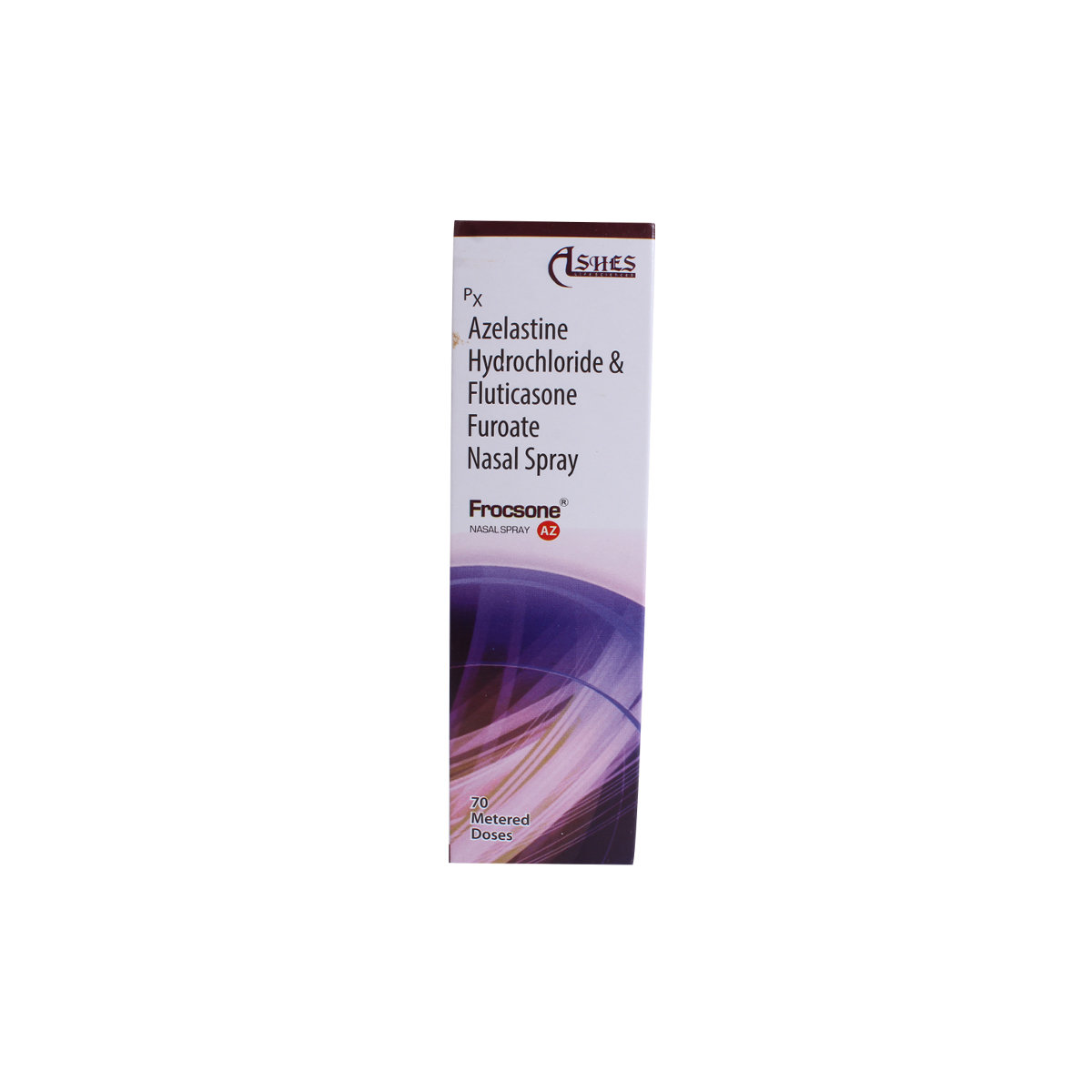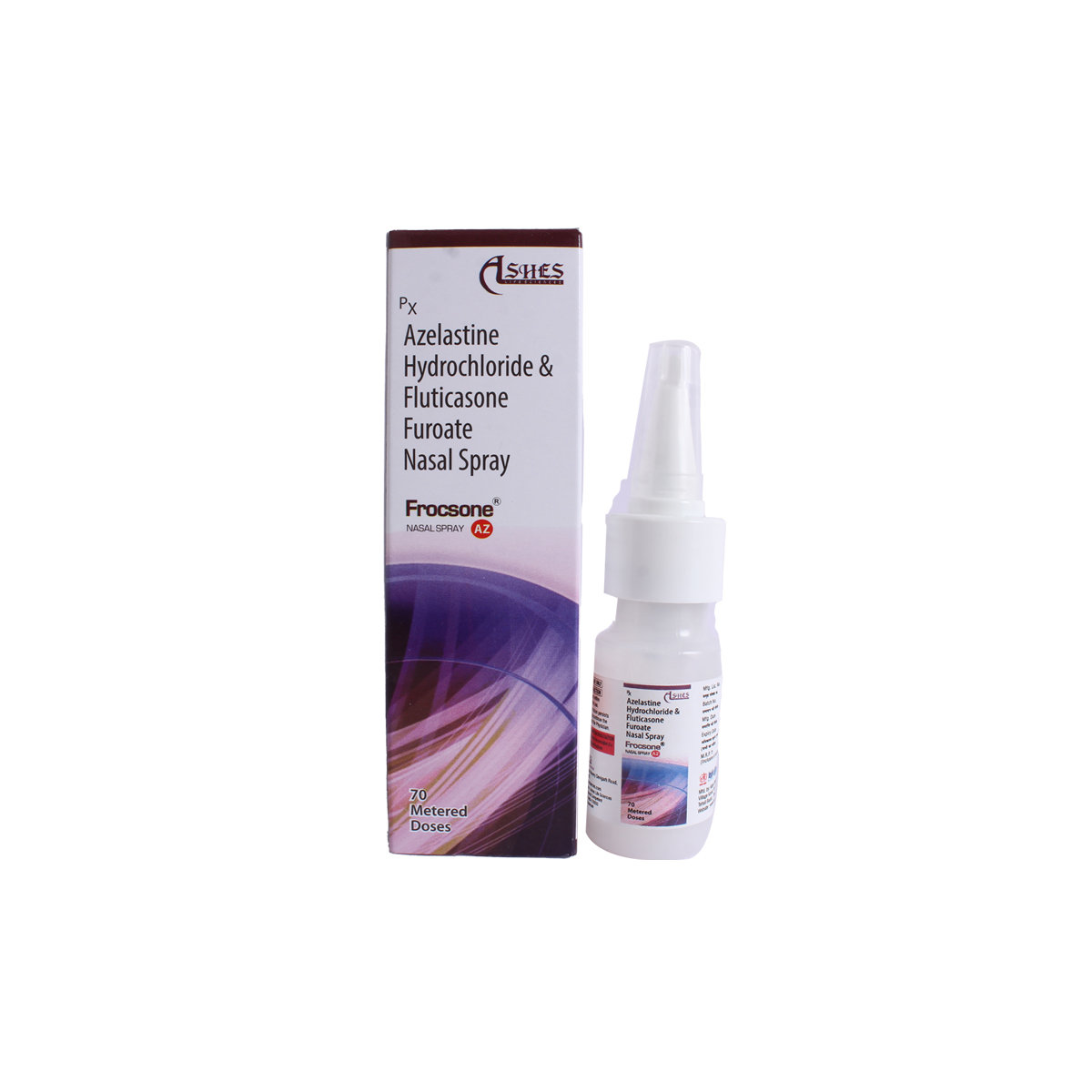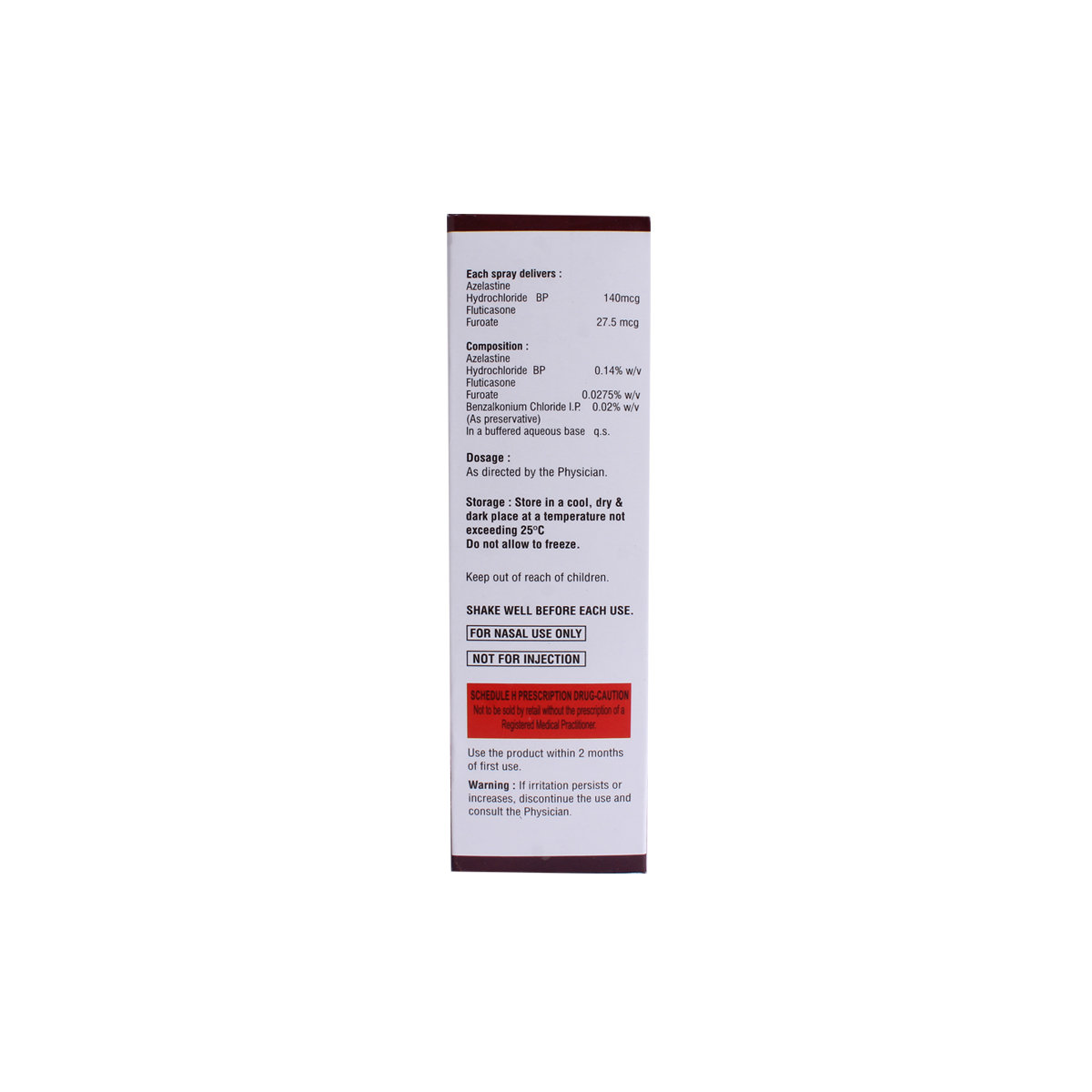Frocsone AZ Nasal Spray 70 mdi
MRP ₹492
(Inclusive of all Taxes)
₹73.8 Cashback (15%)
Provide Delivery Location
Online payment accepted
 Prescription drug
Prescription drugWhats That
Composition :
Manufacturer/Marketer :
Consume Type :
Expires on or after :
Return Policy :
About Frocsone AZ Nasal Spray 70 mdi
Frocsone AZ Nasal Spray 70 mdi belongs to the class of medications called 'antiallergic' primarily used to treat allergic symptoms like sneezing, runny nose, congestion, stuffy nose or watery eyes. An allergy is a condition that occurs when the immune system reacts to a foreign substance. These foreign substances are known as 'allergens.' Allergic condition varies from person to person. Some might be allergic to certain foods and seasonal allergies like hay fever, pollen or pet dander. One of the main symptoms of allergy is cough, which acts as a reflex action in the throat when there is any mucus or foreign irritant entering the respiratory system.
Frocsone AZ Nasal Spray 70 mdi is a combination of two drugs: Fluticasone (corticosteroid) and Azelastine (antihistamine/antiallergic). Fluticasone belongs to the class of corticosteroids that works by acting inside the nasal lining cells and stopping the release of certain chemicals in the body that cause inflammatory reactions, thereby relieving sneezing, runny or blocked nose, and sinus discomfort. On the other hand, Azelastine belongs to the class of antihistamines (antiallergic drugs) that works by blocking histamine, a substance responsible for causing allergic reactions. It helps relieve allergy symptoms such as sneezing, running nose, watery eyes, itching, swelling, congestion, or stiffness. Together, both of them effectively treat allergic symptoms.
Take Frocsone AZ Nasal Spray 70 mdi as advised by your doctor by spraying towards the sides of nostrils. Your doctor will recommend how often you take Frocsone AZ Nasal Spray 70 mdi based on your medical condition. Some people may experience headaches, taste changes or nose bleeds. Most of these side effects of Frocsone AZ Nasal Spray 70 mdi do not require medical attention and gradually resolve over time. However, if the side effects persist or worsen, please consult your doctor.
Inform your doctor if you are allergic to Frocsone AZ Nasal Spray 70 mdi or any other medicines, are pregnant or breastfeeding before using Frocsone AZ Nasal Spray 70 mdi. Frocsone AZ Nasal Spray 70 mdi is not recommended for children below six years of age. If you experience vision changes, tiredness, nausea, vomiting, light-headedness, chills, fever, body pains, sores, redness or white patches in the mouth or throat, runny nose, severe nosebleeds, or increased drowsiness, stop taking Frocsone AZ Nasal Spray 70 mdi and consult a doctor immediately. Avoid contact with people who have infections or are sick as the Frocsone AZ Nasal Spray 70 mdi may weaken the immune system causing infections easily. If you have chickenpox, measles, tuberculosis, surgery or injury on the nose, glaucoma, cataracts, herpes infection of eyes, ulcers, or sores inside the nose, inform your doctor before taking Frocsone AZ Nasal Spray 70 mdi.
Uses of Frocsone AZ Nasal Spray 70 mdi
Directions for Use
Key Benefits
Frocsone AZ Nasal Spray 70 mdi is primarily used to treat allergic symptoms like sneezing, runny nose, congestion, stuffy nose or watery eyes. It combines two drugs: Fluticasone (corticosteroid) and Azelastine (antihistamine/antiallergic). Fluticasone belongs to the class of corticosteroids that works by acting inside the nasal lining cells and stopping the release of certain chemicals in the body that cause inflammatory reactions, thereby relieving sneezing, runny or blocked nose and sinus discomfort. On the other hand, Azelastine belongs to the antihistamines class (antiallergic drugs) that works by blocking histamine, a substance responsible for causing allergic reactions. It helps relieve allergy symptoms such as sneezing, running nose, watery eyes, itching, swelling, congestion or stiffness. Together, both of them effectively treat allergic symptoms.
Storage
- Focus on eating nutrient-rich foods such as citrus fruits, spinach, ginger, garlic, turmeric, and fermented foods to improve immunity and general health.
- Drink plenty of water to stay hydrated, and think about taking probiotics, zinc, vitamin C, and vitamin D supplements.
- Adopt healthful practices such as leading a balanced lifestyle and remaining at home when necessary.
- If you experience nosebleeds or unusual bleeding after taking medication, seek medical attention right away and schedule an appointment to discuss your symptoms with your doctor.
- Your doctor may adjust your treatment plan by changing the dosage, switching to a different medication, or stopping the medication.
- If your doctor advises, take steps to manage bleeding and promote healing, such as applying pressure, using saline nasal sprays, or applying a cold compress, using humidifiers, avoiding blowing or picking your nose, and applying petroleum jelly to the nostrils.
- Schedule follow-up appointments with your doctor to monitor progress, adjust treatment plans, and prevent future episodes.
- Tell your doctor about the cough symptoms you're experiencing, which may be triggered by your medication.
- Your doctor may adjust your treatment plan by changing your medication, adding new medications, or providing guidance on managing your cough symptoms.
- Practice good hygiene, including frequent handwashing, avoiding close contact with others, and avoiding sharing utensils or personal items.
- Stay hydrated by drinking plenty of fluids, such as water, tea, or soup, to help thin out mucus and soothe your throat.
- Get plenty of rest and engage in stress-reducing activities to help your body recover. If your cough persists or worsens, consult your doctor for further guidance.
- A blocked nose can be relieved by drinking more water, which helps clear fluids.
- Use saline nasal spray available over the counter to relieve blockage or blow harder to remove the mucus.
- Use nasal strips that can be placed on the nose to widen nostrils and increase airflow.
- Keep a humidifier around to moisten air at home/workplace.
- Consult your doctor if you experience nasal congestion, runny nose, or sinus pressure after taking medication.
- Your doctor may adjust your treatment plan by changing your medication, adding new medications, or providing guidance on managing your rhinitis symptoms.
- If advised by your doctor, use nasal decongestants or saline nasal sprays to help relieve nasal congestion.
- Practice good hygiene, including frequent handwashing, avoiding close contact with others, and avoiding sharing utensils or personal items.
- Stay hydrated by drinking plenty of water and other fluids to help thin out mucus and soothe your nasal passages.
- Inform your doctor about the symptoms you're experiencing due to medication.
- Your doctor may adjust your treatment plan, which could include changing your medication, adding new medications, or offering advice on managing your symptoms.
- Practice good hygiene, including frequent handwashing, avoiding close contact with others, and avoiding sharing utensils or personal items.
- Stay hydrated by drinking plenty of fluids to help loosen and clear mucus from your nose, throat, and airways.
- Get plenty of rest and engage in stress-reducing activities to help your body recover. If your symptoms don't subside or worsen, consult your doctor for further guidance.
- Drink warm fluids such as warm water with honey, broth, soup or herbal tea to soothe sore throat.
- Gargle with warm salt water.
- Suck on lozenges to increase the production of saliva and soothe your throat.
- Use a humidifier to soothe sore throat as it adds moisture to the air and makes breathing easier.
Drug Warnings
Please inform your doctor if you are allergic to Frocsone AZ Nasal Spray 70 mdi or any other medicines. Do not use the Frocsone AZ Nasal Spray 70 mdi if you are pregnant or breastfeeding without consulting the doctor. Frocsone AZ Nasal Spray 70 mdi is not recommended for children below six years of age. If you experience vision changes, tiredness, nausea, vomiting, light-headedness, chills, fever, body pains, sores, redness or white patches in the mouth or throat, runny nose, severe nosebleeds, or increased drowsiness, stop taking Frocsone AZ Nasal Spray 70 mdi and consult a doctor immediately. Avoid contact with people who have infections or are sick as Frocsone AZ Nasal Spray 70 mdi may weaken the immune system causing infections easily. If you have chickenpox, measles, tuberculosis, surgery or injury on the nose, glaucoma, cataracts, herpes infection of eyes, ulcers, or sores inside the nose, inform your doctor before taking Frocsone AZ Nasal Spray 70 mdi.
Drug-Drug Interactions
Drug-Drug Interactions
Login/Sign Up
Co-administration of Frocsone AZ Nasal Spray 70 mdi with Mifepristone may make Frocsone AZ Nasal Spray 70 mdi less effective as a therapy.
How to manage the interaction:
Taking Frocsone AZ Nasal Spray 70 mdi with Mifepristone is not recommended, consult a doctor before taking it. Do not stop using any medications without talking to a doctor.
Co-administration of Atazanavir and Frocsone AZ Nasal Spray 70 mdi may significantly increase the absorption of Frocsone AZ Nasal Spray 70 mdi into the bloodstream.
How to manage the interaction:
Co-administration of Atazanavir and Frocsone AZ Nasal Spray 70 mdi can lead to an interaction, it can be taken if advised by a doctor. However, if you experience any symptoms like swelling, weight gain, high blood pressure, high blood glucose, muscle weakness, depression, acne, thinning skin, stretch marks, easy bruising, bone density loss, cataracts, menstrual irregularities, excessive growth of facial or body hair, and abnormal distribution of body fat, especially in the face, neck, back, and waist, consult a doctor immediately. Do not stop using any medications without a doctor's advice.
Co-administration of Boceprevir with Frocsone AZ Nasal Spray 70 mdi may significantly increase the absorption of Frocsone AZ Nasal Spray 70 mdi into the bloodstream.
How to manage the interaction:
Co-administration of Boceprevir and Frocsone AZ Nasal Spray 70 mdi can lead to an interaction, it can be taken if advised by a doctor. However, if you experience any symptoms like swelling, weight gain, high blood pressure, muscle weakness, depression, acne, thinning skin, stretch marks, easy bruising, bone density loss, menstrual irregularities, excessive growth of facial or body hair, and abnormal distribution of body fat, especially in the face, neck, back, and waist, consult a doctor immediately. Do not stop using any medications without a doctor's advice.
Co-administration of Troleandomycin may significantly increase the absorption of Frocsone AZ Nasal Spray 70 mdi and tend to increase the risk of side effects.
How to manage the interaction:
There may be a possibility of interaction between Frocsone AZ Nasal Spray 70 mdi and Troleandomycin, but it can be taken if prescribed by a doctor. If you notice any of these symptoms - swelling, weight gain, high blood pressure, high blood sugar, muscle weakness, feeling down, acne, thinning skin, bruises, changes in your period, too much facial or body hair, unusual fat distribution, infection, injury, or a bad asthma attack - make sure to call a doctor right away. Do not discontinue any medications without consulting a doctor.
Co-administration of Dinutuximab and Frocsone AZ Nasal Spray 70 mdi may increase the risk of serious and potentially infections.
How to manage the interaction:
Co-administration of Dinutuximab and Frocsone AZ Nasal Spray 70 mdi can lead to an interaction, it can be taken if advised by a doctor. However, if you experience any symptoms like fever, chills, diarrhea, sore throat, muscle aches, shortness of breath, blood in phlegm, weight loss, red or inflamed skin, body sores, and pain or burning during urination, consult a doctor immediately. Do not stop using any medications without a doctor's advice.
Co-administration of Ketoconazole and Frocsone AZ Nasal Spray 70 mdi may significantly increase the absorption of Frocsone AZ Nasal Spray 70 mdi into the bloodstream.
How to manage the interaction:
If you are supposed to take Frocsone AZ Nasal Spray 70 mdi and Ketoconazole together, doctor may adjust the dose or monitor you more frequently to use both medications safely. However, if you experience side effects such as weight gain, high blood pressure, swelling, muscle weakness, acne, depression, thinning skin, easy bruising, stretch marks, bone density loss, cataracts, menstrual irregularities, excessive growth of facial or body hair, and abnormal distribution of body fat, especially in the face, neck, back, and waist, contact a doctor. Do not discontinue the medication without consulting a doctor.
Co-administration of Nefazodone may significantly increase the absorption of Frocsone AZ Nasal Spray 70 mdi into the bloodstream.
How to manage the interaction:
Co-administration of Frocsone AZ Nasal Spray 70 mdi with Nefazodone can possibly result in an interaction, but it can be taken if a doctor has advised it. A doctor can recommend other options that won't cause any problems when taken together. Do not stop using any medications without talking to a doctor.
Co-administration of Frocsone AZ Nasal Spray 70 mdi with posaconazole may increase the level of Frocsone AZ Nasal Spray 70 mdi in the blood and increase the risk of side effects.
How to manage the interaction:
Although there is an interaction between Frocsone AZ Nasal Spray 70 mdi and posaconazole, they can be taken together if prescribed by a doctor. However, if you experience muscle weakness, acne, thinning skin, easy bruising, stretch marks, menstrual irregularities, excessive growth of facial or body hair, and abnormal distribution of body fat, especially in the face, neck, back, and waist, contact a doctor. Do not discontinue the medication without consulting a doctor.
Co-administration of Mibefradil may significantly increase the absorption of Frocsone AZ Nasal Spray 70 mdi into the bloodstream.
How to manage the interaction:
Taking Frocsone AZ Nasal Spray 70 mdi with Mibefradil together can possibly result in an interaction, but it can be taken if a doctor has advised it. If you notice any of these symptoms - swelling, weight gain, high blood pressure, high blood sugar, weak muscles, feeling down, acne, thinning skin, easy bruising, irregular periods, too much facial or body hair, unusual fat distribution, infection, injury, or a bad asthma attack - make sure to call a doctor right away. Do not stop using any medications without talking to a doctor.
When Conivaptan is taken with Frocsone AZ Nasal Spray 70 mdi, it can make Conivaptan break down faster in the body.
How to manage the interaction:
Co-administration of Conivaptan and Frocsone AZ Nasal Spray 70 mdi can lead to an interaction, it can be taken if advised by a doctor. However, if you experience any symptoms like swelling, weight gain, high blood pressure, high blood glucose, muscle weakness, depression, acne, thinning skin, stretch marks, easy bruising, bone density loss, menstrual irregularities, excessive growth of facial or body hair, and abnormal distribution of body fat, especially in the face, neck, back, and waist, consult a doctor immediately. Do not stop using any medications without a doctor's advice.
Drug-Food Interactions
Drug-Food Interactions
Login/Sign Up
Diet & Lifestyle Advise
- Add ginger to foods or tea as it contains some anti-inflammatory compounds that can relax membranes in the airways and reduce cough, irritation and swelling in nasal passages.
- Staying hydrated is vital for those with a cough or cold. Drink liquids at room temperature to get relief from a runny nose, cough and sneezing.
- The immune system is affected by stress and raises the risk of being sick. Do meditation, deep breathing, regular exercise, and try progressive muscle relaxation techniques to get relief from stress.
- It is advised to avoid contact with known allergens (allergy-causing agents) such as pollen, dust, etc. Certain food items are known to cause allergies to you.
- Maintain personal hygiene and keep your surroundings clean.
Side Effects of Frocsone AZ Nasal Spray 70 mdi
- Drowsiness
- Headaches
- Taste changes
- Nose bleeds
Habit Forming
Therapeutic Class
All Substitutes & Brand Comparisons
Drug-Diseases Interactions
Drug-Diseases Interactions
Login/Sign Up
FAQs
Drug-Drug Interactions Checker List
- DULOXETINE
- ESCITALOPRAM
- PREGABALIN
- RITONAVIR
- KETOCONAZOLE
- FLUCONAZOLE
- ITRACONAZOLE
- CETIRIZINE
Disease/Condition Glossary
Allergy: Allergy is a condition that occurs when the immune system reacts to a foreign substance. These foreign substances are known as ‘allergens’. Allergic condition varies from person to person. Some might be allergic to certain foods and seasonal allergies like hay fever, pollen or pet dander. One of the main symptoms of allergy is cough, which acts as a reflex action in the throat when mucus or foreign irritant enters the respiratory system.

Have a query?
Alcohol
Safe if prescribed
It is unknown whether it is safe to consume alcohol with Frocsone AZ Nasal Spray 70 mdi. However, as a precautionary measure, it is advisable not to take or limit alcohol.
Pregnancy
Consult your doctor
The safety of Frocsone AZ Nasal Spray 70 mdi in pregnant women is unknown. Therefore, it is given to pregnant women only if the doctor thinks the benefits outweigh the risks.
Breast Feeding
Consult your doctor
It is unknown whether Frocsone AZ Nasal Spray 70 mdi is excreted in human milk. It is given to breastfeeding mothers only if the doctor thinks the benefits are greater than the risks.
Driving
Safe if prescribed
Frocsone AZ Nasal Spray 70 mdi may cause drowsiness in some people. Therefore, drive only if you are alert after taking Frocsone AZ Nasal Spray 70 mdi.
Liver
Consult your doctor
Inform your doctor before prescribing the Frocsone AZ Nasal Spray 70 mdi if you have a history of liver impairment/disorder. Your doctor will prescribe only if the benefits outweigh the risks.
Kidney
Consult your doctor
Inform your doctor before receiving the Frocsone AZ Nasal Spray 70 mdi if you have had a kidney impairment/disorder history. Your doctor will prescribe only if the benefits outweigh the risks.
Children
Safe if prescribed
Frocsone AZ Nasal Spray 70 mdi is not recommended for children below six years as the safety and effectiveness were not established.









